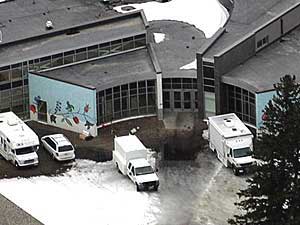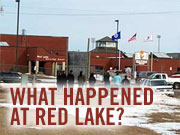March 23, 2005
 |
| An aerial photo of Red Lake High School. Police and investigators vehicles are parked in front of the school Tuesday. (Photo by JEFF HAYNES/AFP/Getty Images) |
St. Paul, Minn. — The "rear-view mirror effect" is how one expert describes trying to understand Monday's shootings on the Red Lake reservation.
Looking back, psychologist David Walsh says, it's easy to point to factors which may have caused Jeff Weise to begin shooting. Walsh is founder and head of the Minneapolis-based National Institute on Media and the Family. He's a leading proponent of the view that violence in our culture, including thousands of hours of violent television images, amounts to "scripts" wired into young people's brains.
"We can't blame all of this on the culture and the media," Walsh says. "But it's part of the combination of emotionally unstable kids -- very, very angry, often bullied by other kids -- who then fantasize, and the fantasy about violence and retaliation gets reinforced to the point that it reaches this tragic conclusion."
University of Minnesota child psychiatrist Dr. George Realmuto offers another view. He argues some people have a genetic risk of problem behavior. Realmuto says traumatic events including bullying, violence at home or rejection increase the chance that people with certain genetic backgrounds will act out.
Realmuto's prescription is controversial. He says people should be screened for genetic markers which show they may be prone to problems later in life.
"We do these kinds of tests to learn people's cholesterol levels and blood sugar levels, and identify people who are at risk for diabetes and heart disease," Realmuto says. "Could we not use genetic tests to identify people who, under specific adverse environmental situations, are more vulnerable to bad outcomes?"
Other experts disagree. They argue there are plenty of people with "bad genes" who endure traumatic events and come through them without resorting to destructive behavior.
There's wider agreement on other ways to prevent tragedies like the shootings on the Red Lake reservation. They boil down to paying more attention to kids on the margin.
Dr. Realmuto says we spend money on young people who have obvious problems or obvious talents, but we often miss helping children who don't fall into one of those two groups.
"The funding streams generally have not allowed us to look at, what do we do with the marginalized kid in the vast middle of the student body -- and I think these will be rare, I'm not predicting we'll have an outbreak of these things. But I don't think we have a mechanism for stopping them," Realmuto says. "The security that we've instituted, and the cameras we've instituted, and the cost for these things were thought to be a way of managing those problems. No one has invested in a significant way in prevention."
The rear-view mirror effect on Monday's Red Lake shootings also raises the issue of the availability of guns. Would there have been as many -- or even any -- victims at Red Lake, or at Rocori, or at Columbine, if the young people had not had ready access to firearms?
Psychologist Gary Schoener, the director of the Walk-In Counseling Center in Minneapolis, says guns in the hands of angry people pose a huge risk.
"The biggest problem with firearms is they kill quickly and they kill efficiently. The problem there is the instant impulse leads to death. The same is true when it happens in the middle of a domestic argument," Schoener says. "There's no question people can kill other ways, but not so quickly and efficiently. And the momentary impulse with a gun -- you shoot off a burst of bullets, you can fire a shotgun and kill four people standing in front of you. It's more impersonal and a heck of a lot quicker."
Schoener says creating a list of the problems Jeff Weise faced in life still doesn't explain what sent the young man over the edge, and caused him to resort to violence Monday on the Red Lake reservation.




